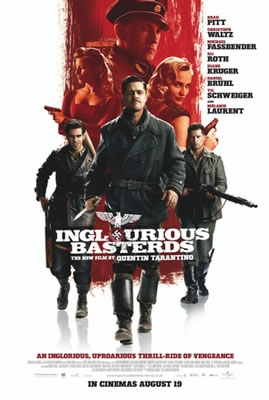 George Lucas was once advised: if you want to make your audience sad, just show them a man strangling some kittens. The brash sentimentality and stolid emotions of Star Wars demonstrate that this was taken to heart. However, what Lucas clearly didn’t understand was that it’s not difficult to make your audience sad: making them care is the hard part. It’s not hard to imagine that Quentin Tarantino was working along these same guidelines when he wrote Inglourious Basterds. It is a film full of nail-bitingly tense conversations, near-misses and diabolical language games, all of which are designed to make and, indeed, do make the audience quiver in their seats. This quivering, however, is derived from the audience’s reaction to situations – however historically inaccurate – that they have seen a thousand times before, on the screen and in their minds; the Jewish family hiding under the floor from a Gestapo agent, the tense to and fro between an SS Commandant and an undercover British agent. These culturally and emotionally loaded situations – guaranteed a response of some sort from any audience – are the backdrop onto which Quentin Tarantino projects his standard brand of substance-less plotting. This is Inglourious Basterds’ main problem. Its other problem, though, is that Tarantino doesn’t do it that badly.
George Lucas was once advised: if you want to make your audience sad, just show them a man strangling some kittens. The brash sentimentality and stolid emotions of Star Wars demonstrate that this was taken to heart. However, what Lucas clearly didn’t understand was that it’s not difficult to make your audience sad: making them care is the hard part. It’s not hard to imagine that Quentin Tarantino was working along these same guidelines when he wrote Inglourious Basterds. It is a film full of nail-bitingly tense conversations, near-misses and diabolical language games, all of which are designed to make and, indeed, do make the audience quiver in their seats. This quivering, however, is derived from the audience’s reaction to situations – however historically inaccurate – that they have seen a thousand times before, on the screen and in their minds; the Jewish family hiding under the floor from a Gestapo agent, the tense to and fro between an SS Commandant and an undercover British agent. These culturally and emotionally loaded situations – guaranteed a response of some sort from any audience – are the backdrop onto which Quentin Tarantino projects his standard brand of substance-less plotting. This is Inglourious Basterds’ main problem. Its other problem, though, is that Tarantino doesn’t do it that badly.
The film follows two separate, simultaneous and seemingly coincidental attempts to blow up a cinema, in which the Nazis are premiering a new propaganda film. One attempt is conducted by the cinema’s owner, a Jewish woman on the run and undercover. The other attempt is conducted by the eponymous ‘Basterds’, a rag-tag group of Jewish soldiers, whose aim is to sink down to the Nazis’ level by beating, scalping and stabbing their way across occupied France. They are led by Brad Pitt and Eli Roth, the latter presumably having been cast to draw attention away from a terrible performance by the gurning Pitt with his own stultifyingly bad turn as Sergeant Donny Donowitz. There is, however, a silver lining, one that makes it impossible to hate Inglourious Basterds, and one that has the film still lingering in the back of my mind, three days after having watched it. This silver lining comes in the form of Cristoph Waltz, a previously near-unknown Austrian TV actor. To understand anything about Inglourious Basterds, one thing must be made clear: despite its lazy edit, its idiotic storyline, and its crushing lack of any real structure, Waltz’s performance is one of the greatest in modern cinema, and made even greater due to its ability to pierce through the disgusting guff that surrounds it.
Waltz’s character – a Jew hunting Nazi Colonel – is absolutely magnetic, interacting with the cultural resonances that the character exudes, rather than just exploiting them for cheap thrills, as does the rest of the film. Indeed, reflecting on Waltz’s performance brings to light many other fine features; the photography often looks beautiful, for every poor editing decision, there is a scene that is cut almost to perfection, and the opening half hour is quite simply perfect. It is almost as if Tarantino assembled such a skilled crew and, to some extent, cast, that it is only he, “QT”, that is holding the film back. With judicious script editing, and a proper structure, without the blaring and obnoxious soundtrack – most of which is stolen (there is no other word for it) from other films – Inglorious Basterds could have been perfectly decent. As it is, Tarantino’s childish indulgence in asinine freeze frames and senseless comedy cutaways make him the film’s own worst enemy; he is the real-life equivalent of the film’s characterisation of Joseph Goebbels: a man who loves cinema to the extent that he wishes to destroy it.

